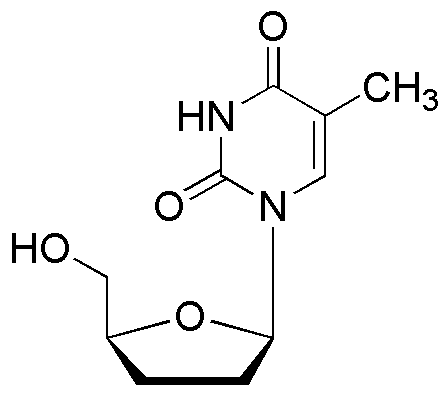2',3'-Dideoxythymidine is widely utilized in research focused on:
- Antiviral Research: This compound is a key player in the development of antiretroviral therapies for HIV. It helps inhibit viral replication, making it essential for researchers developing effective treatments.
- Pharmaceutical Development: Used in the formulation of drugs, it serves as a building block for creating nucleotide analogs, which can enhance the efficacy of antiviral medications.
- Cell Culture Studies: In laboratory settings, it is employed to study the effects of nucleoside analogs on cellular processes, aiding researchers in understanding viral mechanisms and drug resistance.
- Genetic Research: This compound is utilized in molecular biology to investigate DNA synthesis and repair mechanisms, providing insights into genetic disorders and potential therapeutic targets.
- Clinical Trials: It plays a crucial role in clinical research for evaluating the safety and effectiveness of new antiviral drugs, contributing to advancements in treatment protocols for viral infections.
Información general
Propiedades
Seguridad y normativas
Aplicaciones
2',3'-Dideoxythymidine is widely utilized in research focused on:
- Antiviral Research: This compound is a key player in the development of antiretroviral therapies for HIV. It helps inhibit viral replication, making it essential for researchers developing effective treatments.
- Pharmaceutical Development: Used in the formulation of drugs, it serves as a building block for creating nucleotide analogs, which can enhance the efficacy of antiviral medications.
- Cell Culture Studies: In laboratory settings, it is employed to study the effects of nucleoside analogs on cellular processes, aiding researchers in understanding viral mechanisms and drug resistance.
- Genetic Research: This compound is utilized in molecular biology to investigate DNA synthesis and repair mechanisms, providing insights into genetic disorders and potential therapeutic targets.
- Clinical Trials: It plays a crucial role in clinical research for evaluating the safety and effectiveness of new antiviral drugs, contributing to advancements in treatment protocols for viral infections.
Documentos
Hojas de datos de seguridad (HDS)
La SDS proporciona información de seguridad completa sobre la manipulación, el almacenamiento y la eliminación del producto.
Especificación del producto (PS)
La PS proporciona un desglose completo de las propiedades del producto, incluida la composición química, el estado físico, la pureza y los requisitos de almacenamiento. También detalla los rangos de calidad aceptables y las aplicaciones previstas del producto.
Certificados de análisis (COA)
Busque certificados de análisis (COA) ingresando el número de lote del producto. Los números de lote y de partida se pueden encontrar en la etiqueta de un producto después de las palabras "Lote" o "Lote".
Número de catálogo
Número de lote/lote
Certificados de origen (COO)
Este certificado de origen confirma el país en el que se fabricó el producto y también detalla los materiales y componentes utilizados en él y si se deriva de fuentes naturales, sintéticas u otras fuentes específicas. Este certificado puede ser necesario para cumplir con las normativas aduaneras, comerciales y regulatorias.
Número de catálogo
Número de lote/lote
Hojas de datos de seguridad (HDS)
La SDS proporciona información de seguridad completa sobre la manipulación, el almacenamiento y la eliminación del producto.
DownloadEspecificación del producto (PS)
La PS proporciona un desglose completo de las propiedades del producto, incluida la composición química, el estado físico, la pureza y los requisitos de almacenamiento. También detalla los rangos de calidad aceptables y las aplicaciones previstas del producto.
DownloadCertificados de análisis (COA)
Busque certificados de análisis (COA) ingresando el número de lote del producto. Los números de lote y de partida se pueden encontrar en la etiqueta de un producto después de las palabras "Lote" o "Lote".
Número de catálogo
Número de lote/lote
Certificados de origen (COO)
Este certificado de origen confirma el país en el que se fabricó el producto y también detalla los materiales y componentes utilizados en él y si se deriva de fuentes naturales, sintéticas u otras fuentes específicas. Este certificado puede ser necesario para cumplir con las normativas aduaneras, comerciales y regulatorias.


